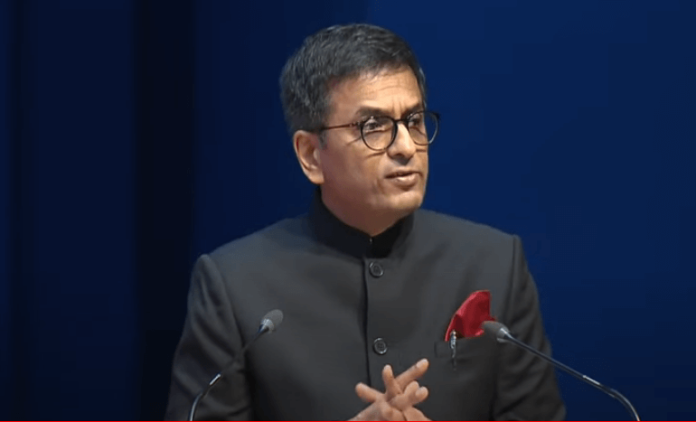Chief Justice of India DY Chandrachud on Sunday said that celebrations of the Constitution Day symbolised the social life of an independent nation, underscoring the success of India’s democracy as compared to other post-colonial nations.
Answering queries on the need for a separate celebration when Independence Day and Republic Day were already celebrated across the country, the CJI said the answer was in the success of Indian democracy as opposed to the countries that gained independence from colonialism at the same time as India.
Speaking during the celebrations of the 74th Constitution Day at the Supreme Court premises, the CJI said the history of decolonisation across the world was full of examples of countries, which threw open the doors of independence only to falter at the steps of self-governance.
India has not only maintained her Constitution, but the people of the country have imbibed and internalised the Constitution as a symbol of their aspirations, he added.
He said the Constitution has effectively channelled the energies of people through institutional structures of government, steering the nation toward the ideals of liberty, equality, and fraternity.
As per the CJI, when people of the country said they honoured the adoption of the Constitution, first and foremost, they honoured the fact that the Constitution existed and secondly, that the Constitution was working.
He said the Constitution and its framers successfully channelled the energies of independence to build a ship to chart a course for liberty, equality, and fraternity.
As people of the country honour their achievements, they must also recognise this generation’s solemn duty to keep the ship afloat, ensuring that there was wind in India’s sails, and that the country continued its journey, added the CJI.
Stating that the doors of the Supreme Court will always remain open for citizens to ventilate their grievances, CJI Chandrachud said that individuals should not be afraid of going to court or view it as a last resort, expressing the hope that owing to the efforts to make the judicial infrastructure more ‘citizen-centric’, citizens of all classes, castes, and creeds can repose their trust in the court system and view it as a ‘fair’ and ‘effective’ forum to enforce their rights.
He said people came to the court in the hope of getting justice, ranging issues from clean air and water to personal liberty. The citizens also raised broader societal concerns such as bonded labour, tribal land rights, workplace sexual harassment and prevention of social evils like manual scavenging.
The CJI said the Supreme Court of India was the only court where any person can set in motion a constitutional machinery by just writing to the Chief Justice of India.
He said from postcards of the paper age to a simple email in the digital age, this was all that it took to move the Supreme Court for an urgent case listing, sometimes even on the same day.
He said these cases were not just citations or statistics for the court, but they resembled people’s expectations from the Supreme Court as well as the court’s own commitment to deliver justice to the citizens.
The CJI highlighted the court’s efforts to make its proceedings more transparent, such as live-streaming sessions and its commitment to citizen-centric administrative processes.
He also mentioned the court’s engagement with technology, introducing e-seva kendras in all courts to ensure broader inclusion of citizens in the judicial process.
Earlier, President Droupadi Murmu unveiled a statue of the Architect of the Indian Constitution, Dr. Bhim Rao Ambedkar, at the Supreme Court premises, on the occasion of the 74th Constitution Day of India.
The event was attended by Union Minister of State for Law and Justice Arjun Ram Meghwal, Supreme Court judge Justice Sanjay Kishan Kaul, Attorney General for India R. Venkataramani and Supreme Court Bar Association (SCBA) President Dr. Adish C. Aggarwala, among others.


